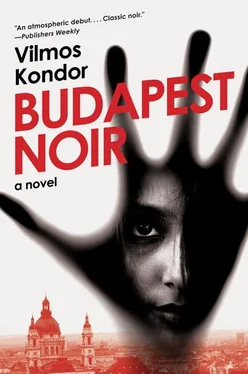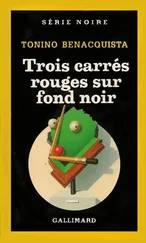“Can you tell me where I can find Pojva?”
“Who’s that?”
“Pojva.”
“Hey, Erzsike,” said the old man, giving his wife a shove. “This gentleman here is looking for some character called Pojva.”
“I dunno no one called that,” replied the old woman from a wrinkled, kerchief-wrapped face.
As Gordon described Pojva’s features, the woman made the sign of the cross and looked to the sky.
“You’re looking for that . . . that broken-nosed scoundrel?”
“That’s the one.”
The old woman toddled out to the front of their shanty and showed Gordon which way to go. Here, street names and numbers didn’t mean a thing. Gordon thanked her for the directions and headed on, trying not to sink ankle-deep into the mud as he walked. Dogs howled as they tore at their chains, and cats meowed from the roofs they’d fled to from the mud.
Soon he found the shanty he was looking for. Decaying wooden shutters hung from the windows facing the road, their tulip carvings looking rather wilted. Beside the shanty was an adobe pigpen. Two kids around ten years old were playing in the muddy yard with a bicycle wheel. They were having a wonderful time, even though the wheel wouldn’t turn.
“Is Pojva home?” he asked one of them.
The child did not reply, but ran squealing into the shanty. A few moments later, out stepped Pojva, evidently in the throes of a serious hangover. His trousers had slipped somewhat under his waist, and he was naked above them. He must once have been a big and rock-hard man, but his muscles were now flabby and his skin had slackened, too. What with the combination of his crooked nose and a more or less stout frame, however, he still presented a spectacle that commanded respect and inspired fear.
“I know you from somewhere,” he said to Gordon.
“I have a proposal,” Gordon replied.
“You got money to back it up?”
Gordon nodded. Pojva just stood there for a while, staring at him. Gordon must indeed have looked familiar, but Pojva couldn’t quite place him. “Wait here,” he finally said, and went back inside. Soon there came the sound of shrieks and sobbing, and out came a fortyish woman.
“Please don’t go talking to him, sir,” she pleaded, “it always means trouble.” At this, Pojva seized her from behind, turned her toward him, and gave her a slap. She fell to her knees. He then kicked her in the back, which sent her flying into the mud.
“What business is it of yours who I talk to,” he sputtered, then waved a hand to Gordon. “Come right in.”
The shanty stank to high heaven. Something was bubbling away in a pot on the stove, and curled up in the corner was a sopping-wet dog. Water dripped from the ceiling into a cracked metal vat on the kitchen table, and an oil lamp flickered beside it. Pojva plopped down on one of the chairs, stuck a cigarette into his mouth, and kicked the other chair out from under the table toward Gordon. “How much?” he asked.
“You don’t even know what this is about,” replied Gordon.
“You didn’t come here because you need a gardener,” said Pojva, scanning Gordon’s face in the hope of recognizing him, but in the end he just gave a dismissive wave of the hand.
“Twenty,” said Gordon, putting two ten-pengő banknotes on the table.
Pojva reached over greedily, snatched up the bills, and cried out: “Woman!” His frightened wife stuck her head in the door. “Here’s some motherfucking money, goddamnit. Now get going. Go buy some oil and some real grub.” Giving the stove a sound kick, he added, “Not even the dog is gonna eat this shit.” The thick, suspect fluid in the pot splattered on the woman’s leg. Wincing, Pojva’s wife stepped just close enough to take the ten-pengő bill held out by her husband, then got going fast.
“Now let’s have it,” Pojva spat out, “whadayawant?”
“Tonight you’re having . . . a bout.”
“Not me.”
“Sure you are.”
“How am I supposed to know you’re not a cop?”
“Would a cop have given you twenty pengős?”
Pojva pondered the matter. “And let’s say I did have a bout?”
“Then you’d be up against that Polish kid, Jacek, at the factory grounds on Gubacsi Road.”
“If I did have a bout,” said Pojva with a nod, “that’s where it would be.”
“And who would win?”
“In an honest match you never can say,” pokerfaced Pojva replied.
“Not even for fifty pengős?”
Pojva’s eyes glittered with greed. “No way for fifty, but maybe for a hundred.”
“I understand,” said Gordon. “If it’s possible to say for a hundred who’s going to win tonight, why then, the winner might even be Jacek. Let’s say in the second round he could knock you out.”
“For a hundred pengős,” said Pojva, licking his lips, “he might even win.”
“Say, Pojva,” asked Gordon. “Did anyone else come by asking if you’d have a bout tonight? And if you did, who would win?”
“No,” Pojva replied. “The bookie is always asking, but no one else.”
Gordon now reached inside his wallet and pulled out five twenty-pengő banknotes. Pojva snatched out for them, but Gordon was faster. He pulled away his hand. “On one condition.”
“What’s that?”
“I give the money to your wife,” said Gordon.
“Not a chance!” cried Pojva.
“Sure there is. Would you rather go to a detention camp?”
Pojva knit his brows. He thought long and hard. Finally, he licked his lips and slowly nodded.
“If tonight’s fight ends the way we suspect it will,” said Gordon, “we might even do business together regularly.”
“No problem,” said Pojva, and Gordon could see in his eyes that he would beat the money out of his wife.
“Let’s be sure of that,” said Gordon, rising from the table.
“There won’t be,” said Pojva, who then picked a bottle of denatured alcohol off the floor and took a swig. He gave Gordon the once-over. “Get going already—I’ve got to get ready for my match.”
“Box like you mean it,” said Gordon. “Mr. Szőllősy doesn’t like to be let down.”
“Who?”
For a moment Gordon thought he’d made a mistake. “The gentleman who sent his secretary to see you.”
“Oh, him?” said Pojva, looking up at Gordon. “He also said his boss likes a job done just right. Well, I sure didn’t let him down.”
“You sure taught that girl a lesson. Did he tell you to knock her dead?”
“No,” said Pojva, shaking his head. “Just to give her a scare. How was I supposed to know that dame was such a lightweight?” he asked, talking to the bottle before him. “I barely waved my hand at her, and she up and died. No matter, she was just some slut, anyway.”
“That’s right,” said Gordon with a nod. “Just some slut. And what did you do with the money?”
“What money?”
“Calm down, Pojva, the gentleman doesn’t care about the money. It’s just me who wants to know what happened to it. How much did she have with her? Almost two thousand pengős?”
“Only about a thousand five hundred.”
“And what did you spend it on?” asked Gordon, looking around. “Medicine?”
“What do you care?” snarled Pojva, taking another swig. “Debts. Sharks.”
“Did the gentleman’s secretary say you should take the money?”
“Of course. He said whatever she’s got on her is all mine.”
“How did you do it?” asked Gordon. Something was not right with Pojva’s muddled stare.
“What do you care?”
“We like to know how our employees operate.”
Pojva only shook his head, but then answered all the same. “First I gave her a slap; then I took her purse. She was lying there on the ground, and I took it from her hands.”
Читать дальше
Конец ознакомительного отрывка
Купить книгу












